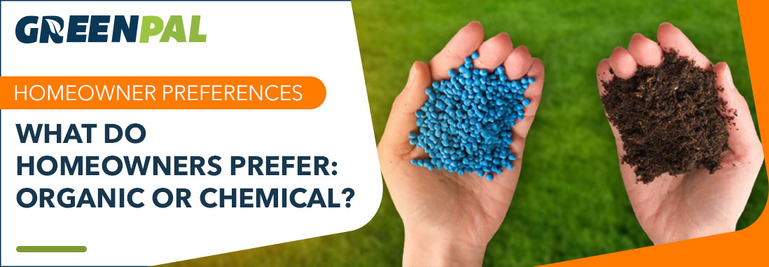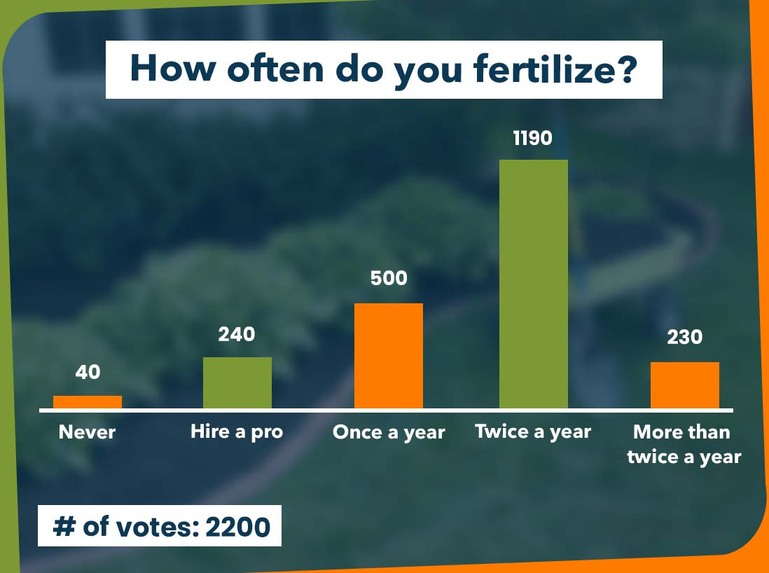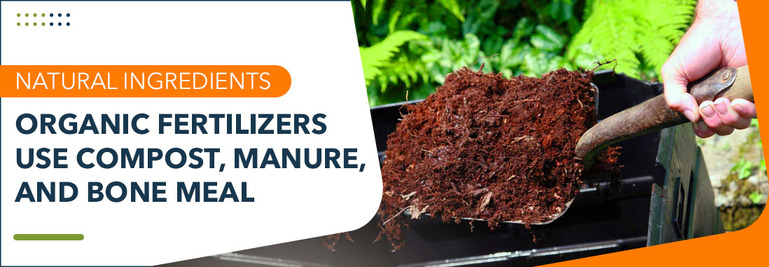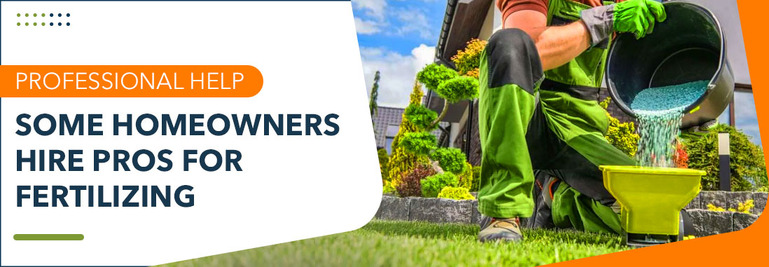Organic vs Chemical Fertilizers – What Homeowners Prefer and Why

The debate of whether to use organic fertilizer or chemical fertilizer always makes its rounds. We've covered it quite extensively. Check out these posts:
And these are just the tip of the iceberg.
Why all the focus on fertilizer? Homeowners want to keep their lawns healthy and their pets and children safe, and we want to help them as best we can when selecting and utilizing products. There are other reasons, too, so we asked 2200 homeowners more about their fertilizing habitats and the types of products they choose.
Key Takeaways:
|
|
|
|
|
Survey Summary
How often do you fertilize?
Never: 40 votes
Hire a pro: 240 votes
Once a year: 500 votes
Twice a year: 1190 votes
More than twice a year: 230 votes
What type of fertilizer do you prefer to use?
Organic: 1360 votes
Chemical: 560 votes
Neither: 280 votes
The Pros and Cons of Chemical and Organic Fertilizers
Pros of Chemical Fertilizers
Cost-effective: Most chemical fertilizers are more cost-effective than organic ones because they are mass-made. So, if you're on a tight budget for lawn maintenance, these chemical products may be the way to go.
Quick results: Another significant advantage of chemical fertilizers is that they produce results fast. The nutrients in chemical fertilizer are readily available for plants to take up, and lawn health and greenness rapidly improve within days of application.
Easy to apply: Chemical fertilizers are more widely available in both solid and liquid forms: granules and liquids make it convenient for homeowners to spread or spray their fertilizer, whichever works best for them.
Cons of Chemical Fertilizer
Environmental risks: Many chemical fertilizers cause environmental concerns since they can run off lawns and into drainage ditches and other bodies of water, potentially causing issues with water sources.
Risks of over-application: Chemical fertilizers can destroy lawns and the roots of plants if more is applied than the lawn requires. Because of this, chemical fertilizer requires careful measuring and adherence to the guidelines to ensure a lawn isn't damaged.
Pros of Organic Fertilizers

Natural ingredients: Organic fertilizers are derived from things such as compost, manure, bone meal, and other plant- and animal-based items without synthetic ingredients. Many are biodegradable and often do not produce the same levels and types of toxins. Instead, they contain nitrogen-fixing bacteria that contribute to the nitrogen cycle. They are also carbon-rich, so they decompose slowly and have a slower release for plant uptake.
Enhances soil health: Organic fertilizers improve the soil structure and increase the organic matter content, which gives rise to better soil aeration, water retention capability, and good microbial activity, in turn leading to overall better health of the soil to host the growth of grass.
Safer for pets: Organic fertilizers are generally safer for pets and children. The benefit of using organic fertilizer, unlike chemical fertilizers that may contain dangerous artificial chemicals that could be hazardous to pets and children, is that their ingredients are typically less harmful.
Cons of Organic Fertilizer
Higher Cost: The cost of being organic is higher. It is more costly in many arenas, especially when using natural ingredients and expensive procedures to create these products.
Slower results: Organic fertilizers release their nutrients more slowly than chemical fertilizers. So, lawn health benefits typically take longer to show. Homeowners must be patient and stick with their applications to see the benefits.

A few homeowners hire a pro to help with fertilizer
Many homeowners try their best to keep their yards in good condition. And when it comes to the lawn, a few survey takers choose to outsource the work to professional lawn care services. Several survey takers said they use professional lawn care services to fertilize their lawns.
For a handful, hiring a well-trained professional is worth the investment.
When homeowners choose to fertilize themselves, they run the risk of not using the right amount of fertilizer. They might apply the wrong type of fertilizer at the wrong time.
Each lawn has unique needs. The lawn may require a different fertilizer and approach based on factors such as the season, the region, and the grass type. One size fits all often doesn't cut it.
Professionals know the proper amount of fertilizer to use and the time of year they should be applied, ensuring a healthy, more robust lawn while reducing the risks of over-fertilization.
Caring for a lawn is a continuous process; yards need a lot of attention. Hiring a professional ensures that your lawn receives consistent care and critical treatments year-round. Consistency under good hands also guarantees better results in the long run.
Cost topped the list for respondents who don't hire a lawn care professional. Hiring a professional service is more costly.
Pet-Safe Fertilizers: A Growing Concern
Purchasing organic fertilizers for use in the yard has grown in popularity to protect little ones and furry friends. Organic fertilizer is more desirable for many than synthetic products due to the few risks pets might face from fertilizer application.
Pet safety is a primary motivation for homeowners who believe that no family member, furry ones included, should come to any harm while enjoying their lawn.
The problems homeowners have with chemical fertilizers come with the ingredients. Most fertilizers contain nitrogen, potassium, phosphorus, and iron.
According to the Pet Poison Helpline, "small ingestions of fertilizer may only result in mild stomach upset; larger ingestions can result in severe poisoning from the iron, nitrogen and other chemicals."
Quick Summary
Aspect |
Details |
Survey Summary |
Frequency of Fertilization: Never: 40 votes, Hire a Pro: 240 votes, Once a Year: 500 votes, Twice a Year: 1190 votes, More than Twice a Year: 230 votes. Fertilizer Preference: Organic: 1360 votes, Chemical: 560 votes, Neither: 280 votes. |
Pros and Cons |
Chemical Fertilizers: Pros - Cost-effective, quick results, easy to apply. Cons - Environmental risks, over-application risks. Organic Fertilizers: Pros - Natural ingredients, enhances soil health, safer for pets. Cons - Higher cost, slower results. |
Professional Lawn Care |
Ensures correct application, consistency, and better long-term results. |
Pet-Safe Fertilizers |
Growing concern due to fewer risks for pets and children. |
Conclusion |
Homeowners prefer organic fertilizers for safety; some hire professionals for optimal lawn care. |
We asked 220 homeowners how often they fertilize and whether they choose chemical or organic products. We reviewed a view of the pros and cons of both organic and chemical fertilizers. Homeowners noted that they prefer organic products for the safety of their children and pets. Several respondents noted they hire a professional to help with things such as fertilizing. To them, the professional care that their lawns receive is worth the investment.




 Share
Share







